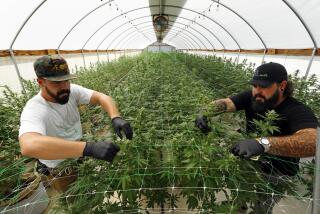Is marijuana good medicine?
- Share via
The Los Angeles City Council voted Tuesday to ban medical marijuana dispensaries in the city, the culmination of years of controversy over the sale of pot here. Meanwhile, in Oakland, a federal crackdown closed the nation’s largest dispensary amid protests and demonstrations. But authorities rarely seem to address the real issue about marijuana in California: Is it good medicine?
Some proponents of medical marijuana argue that pot is “natural” and therefore better, or at least no worse, than legally prescribed drugs, which may be addictive and may carry dangerous side effects. But natural is not the standard for whether a drug is safe and effective.
Marijuana advocates also say that physicians who warn against marijuana merely want to push prescriptions. But just because some doctors practice bad medicine with legal drugs doesn’t make marijuana good medicine. In most cases, it isn’t.
Anyone who wants to get a medical marijuana card knows there are unscrupulous doctors who will give you a recommendation with few questions asked. Without doubt, medical marijuana hands a get-out-of-jail-free card to people who just want to get high. Those who get a card and indulge in the infrequent use of marijuana will probably experience few problems. But the situation is different with chronic marijuana use.
Marijuana acts on cannabinoid receptors in the brain. These receptors, which are the most prevalent in the nervous system, influence just about every bodily function, including memory, attention, disposition, arousal, motivation, perception, appetite and sleep.
Many chronic marijuana users insist that marijuana is not addictive the way alcohol and other drugs are. However, neuroscience, animal studies, clinical reports of withdrawal in humans and epidemiology all show that marijuana is potentially addictive.
As to its benefits, controlled clinical studies show they exist, but they are limited. Marijuana can effectively treat neuropathic pain, and it has been shown to improve appetite and reduce nausea in cancer and AIDS patients.
But other generally accepted ideas about marijuana’s effectiveness don’t hold up.
The Glaucoma Research Foundation disputes the idea that medical marijuana is good medicine for the disease. “The high dose of marijuana necessary to produce a clinically relevant effect,” the foundation’s website explains, makes it a poor choice for the treatment of glaucoma, especially given its “significant side effects” and the availability of safer effective drugs.
In addition, those who use marijuana to treat mental health symptoms might be surprised to learn that studies show it not only may not help such symptoms, it may cause them.
Increased funding for research may lead to a better understanding of the impact cannabis has on our bodies, but for now the claims that the drug is effective in the treatment of multiple disorders as distinct as lupus and anxiety seem far-fetched at best. It seems more likely that for some people, getting high just makes them feel better, the way a drink or two might. You would be shocked, however, if in response to a diagnosis of lupus, your doctor suggested you “take two drinks and call me in the morning.”
And pot’s general ineffectiveness is only part of picture. It is not a neutral substance. Chronic marijuana use is associated with a number of well-documented health problems, including a variety of cancers in adults as well as in children who were exposed to the drug in utero.
As to its mental health effects, marijuana is linked to long-term psychiatric problems such as depression, anxiety and psychosis. “Marijuana often is regarded as a ‘soft drug’ with few harmful effects,” says Dr. Joseph M. Pierre, co-chief of the Schizophrenia Treatment Unit at the Department of Veterans Affairs’ West Los Angeles Healthcare Center. “However, this benign view is now being revised, along with mounting research demonstrating a clear association between cannabis and psychosis.”
If the lack of health benefits and manifest risks aren’t enough to raise doubts about medical marijuana, consider basic questions of quality and dose. Although medical marijuana sometimes comes from “cleaner” sources than say a drug cartel, independent labs have found mold, synthetic insecticides and other toxins in pot. Molds such as Aspergillus can be highly dangerous to immune-compromised patients. And there is no way to accurately judge what a proper dose of dispensary marijuana would be.
Habitual marijuana use is helpful for very few medical conditions. It can cause insidious changes in personality and attitude that are clear to everyone but the users themselves. There are nearly 400,000 emergency room visits per year due to marijuana use. Before we advocate for medical marijuana, and before another person doses himself with it, we have to ask: Is medical marijuana making us sick?






